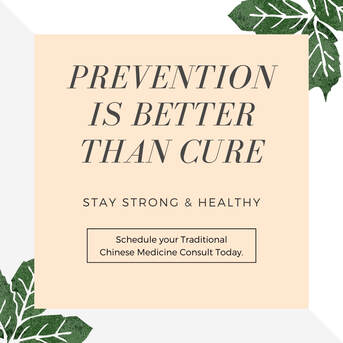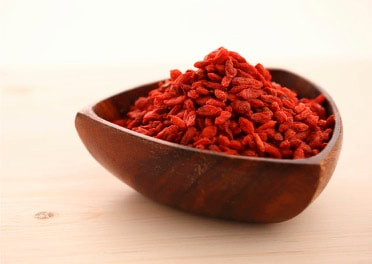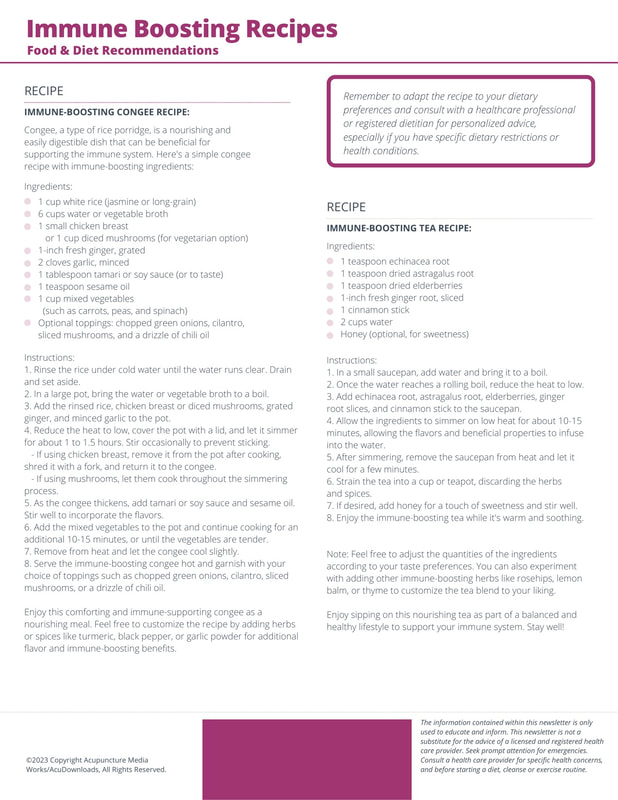 In our ongoing pursuit of optimal health and well-being, it is crucial to pay attention to our immune system. The immune system serves as our body's defense mechanism, protecting us from external pathogens and internal imbalances. Acupuncture, a cornerstone of traditional Chinese medicine, offers a holistic approach to support and strengthen the immune system. In this article, we will delve into the concept of Wei Qi, discuss how acupuncture can enhance immune function, and provide self-care suggestions for promoting a resilient immune system. Understanding Wei Qi and the Immune System: According to Chinese medicine, Wei Qi is a vital aspect of our immune system. Wei Qi refers to the body's protective energy, which forms a barrier against external pathogens. It circulates on the surface of the body, guarding us from invading pathogens such as viruses, bacteria, and allergens. When our Wei Qi is strong and balanced, we are better equipped to resist illnesses and maintain optimal health. Acupuncture works by restoring the balance of energy within the body, including strengthening the Wei Qi and supporting immune function. Here are some ways acupuncture can help enhance your immune system: 1. Regulating Immune Response: Acupuncture has been shown to regulate immune responses by modulating the activity of immune cells and promoting a balanced immune reaction. It can help calm overactive immune responses in conditions such as allergies, autoimmune disorders, and chronic inflammation. 2. Boosting White Blood Cells: Acupuncture has been found to increase the production of white blood cells, including T-cells and natural killer cells, which play key roles in immune defense. By boosting the activity of these cells, acupuncture strengthens the body's ability to fight off infections and diseases. 3. Enhancing Energy Flow: Acupuncture stimulates specific points along energy pathways, known as meridians, to promote the smooth flow of Qi. By improving energy circulation, acupuncture helps to nourish the organs involved in immune function, such as the spleen and lungs, fostering a robust immune response. Self-Care Practices to Support Your Immune System: In addition to acupuncture treatments, incorporating self-care practices into your daily routine can further strengthen your immune system. Here are a few suggestions: 1. Prioritize Quality Sleep: Adequate sleep is vital for immune health. Aim for 7-8 hours of restful sleep each night to allow your body to recharge and regenerate. Establish a bedtime routine, create a comfortable sleep environment, and consider acupuncture to address any sleep disruptions. 2. Manage Stress Levels: Chronic stress can weaken the immune system. Incorporate stress-management techniques into your routine, such as mindfulness meditation, deep breathing exercises, yoga, or tai chi. Acupuncture can also help reduce stress and promote relaxation. 3. Balanced Nutrition: Maintain a balanced diet rich in whole, unprocessed foods to provide your body with essential nutrients. Focus on consuming a variety of fruits, vegetables, lean proteins, whole grains, and healthy fats. Consult with an acupuncturist for dietary recommendations that support immune health based on your individual constitution. 4. Regular Exercise: Engage in moderate exercise regularly to promote circulation, reduce inflammation, and support immune function. Find activities you enjoy, such as walking, swimming, or dancing, and incorporate them into your routine. Remember to listen to your body and consult with your acupuncturist for exercise recommendations. 5. Prioritize Self-Care: Make time for activities that promote relaxation, reduce stress, and nurture your overall well-being. This may include reading, spending time in nature, practicing hobbies, or enjoying quality time with loved ones.  Egg health Getting pregnant can be frustrating when it isn’t happening as easily as planned. There are many reasons you could be dealing with a difficult pregnancy including egg health. There are many factors that play into egg health including blood circulation, stress and hormonal balance. For improving blood and oxygen flow, try to get some sort of exercise whether it is yoga, running or simply going on a brisk walk at least three times a week. Ask a massage therapist about abdominal massage, which can increase blood flow to the reproductive system. Stress can also play a very important factor in egg health. Find ways to destress with meditation practices, acupuncture and deep breathing. Hormonal balance Hormonal imbalances in women are common and can result in weight gain, fatigue, skin problems, infertility and PMS. Hormones are an important part to our body’s growth and development, mood, reproduction and metabolism. To keep your body in balance, avoid high omega-6 polyunsaturated fats that are found in vegetable oils. Reduce your caffeine intake. Too much caffeine can have a negative impact on the endocrine system. Most importantly, make sure to get an adequate amount of sleep each night. When the body does not get enough rest, hormones cannot regulate. Breast health There are many reasons that some women have a higher risk of breast cancer including both genetics and environmental impacts. Research has shown that keeping a diet of fresh, unprocessed foods can help the health of breast tissue. Chemical exposure from foods as well as other environmental factors have been shown to be high in women who have breast cancer. Foods to eliminate from your diet include highly processed foods, additives, canned foods and soy. Avoiding foods that are high in hormones and adding foods that are packed with antioxidants such as berries can help lower your risk of breast cancer. Metabolism Many women feel their metabolism has slowed over the years, making it harder to break down and burn calories and fat. Try adding more omega-3 fatty acids into your diet such as salmon and tuna. Omega-3 fatty acids have been found to help regulate blood sugar and lower inflammation, which can then improve metabolic function. Increasing strength training can also help give the metabolism a boost. The more muscle you have, the more your resting metabolism will increase to burn fat. Lastly, eating breakfast has been shown to give your metabolism a jump start for the day compared to eating your first meal later in the day. Immune health Don’t let the cold and flu season get you down this year. There are many natural ways to boost your immune system to prevent illness and to improve energy levels. Assess your stress levels and take action if you are feeling stressed and overwhelmed. Spend some time practicing deep breathing or finding an activity that you find relaxing. Try adding in more garlic and ginger to your diet. These natural ingredients contain properties that help boost the immune system and lower cold and flu symptoms. Try Acupuncture! - yes, Acupuncture has the ability to help with ALL of these aspects of women's health. Using hair-thin needles to stimulate the movement of Qi in the body, Acupuncture works to balance the energetic system and remind your body how to be optimally well and healthy. Many fertility clinics employ acupuncturists on site, especially to improve the success of IVF transfer, based on recent research. If you're interested in Acupuncture to improve your health, consider making an appointment today! http://natural-fertility-info.com/increase-egg-health http://wellnessmama.com/5946/natural-breast-health/ http://wellnessmama.com/5425/balance-hormones/ http://www.health.com/health/gallery/0,,20306911_7,00.html  Ready for some exciting news? Gary Wass, LMT who is an incredible massage therapist, will be seeing patients and teaching Tai Qi on site here at the Heritage Center starting September 30th. Tai Qi classes will be held out of Blissed Bodywork next door from 9-10 am on Saturdays. Check out the Blissed Bodywork class schedule HERE Gary will also be on site working out of my office providing massage services Saturdays after class. Interested in signing up? Click HERE to book a massage appointment direct with Gary. Gary is an incredible practitioner with a passion for helping people. He has a specialty in Asian styles of bodywork such as Tuina and Thai massage and over 20 years of experience with massage and martial arts instruction. Gary and I met through his wife Sarah when she and my husband worked together out of a Physical Therapy clinic in SW Portland many many years ago. I am so excited that Gary and Sarah have crossed the river from PDX to SW Washington and that Bhrigha and I get the privilege of sharing his knowledge and services with you. You can click HERE to go to Gary's website and learn more about his practice and his services, or click below to book in for a Tai Qi class or Massage. Gary is offering a $20 special to new patients in La Center for a limited time, book now!  A study conducted by the Tzu Chi University in Taiwan demonstrated that cupping, a modality of Traditional Chinese Medicine, provided significant pain relief for chronic neck and shoulder pain. The participants in the study received a total of four cupping therapy treatments that lasted 10 to 15 minutes. They also received acupuncture and massage. The effects were measured using skin surface temperatures, blood pressures and pain intensity levels of each participant. Overall, the surface temperatures increased, indicating better blood flow to the area, while the blood pressure measurements and the pain intensity levels decreased. This study confirms acupuncture and specifically, cupping therapy, can be provide effective pain relief without the harsh side effects of pharmaceuticals. Neck pain is one of the most widely noted ailments in the world. Chronic neck pain is generally a type of musculoskeletal pain that occurs most commonly in middle and older aged people. This type of pain can be quite debilitating and it can affect a person’s life in multiple ways. Neck pain can prevent people from exercising, getting proper rest and even interacting with friends and family. The effects of chronic neck pain can be physical, mental and emotional. In the past, neck pain has been treated with over-the-counter painkillers or prescription painkillers, plus anti-inflammatories. However, there is currently a severe opioid crisis facing the United States and because of this, prescription opioids and the doctors that prescribe them are under scrutiny. Also, over-the-counter painkillers, like ibuprofen, are known to deteriorate the lining of the gastrointestinal tract increasing ailments such as acid reflux and ulcers. As an alternative, acupuncture and cupping are highly recommended, as they are natural and have virtually no side effects. The toolbox of the TCM practitioner is filled with many items that allow for holistic treatments of the patients. Acupuncture is one of the tools that works very well at decreasing and eliminating chronic neck pain. But another modality has recently come into the spotlight and it is known as cupping therapy. Cupping therapy is a very old technique. Traditionally, a flame is inserted into a glass cup, drawing out the oxygen and creating negative pressure. The cup is quickly placed on the area affected to form suction. The sucking action of the cups draws out toxic blood and waste products, while drawing in oxygen-rich blood. The oxygen-rich blood being drawn into the muscles allows for faster healing of the affected area. The increased blood flow into the area also allows for the tissues to heal and become less tense. When cupping is added to regular acupuncture treatments, the results can be amazing. Acupuncture also stimulates blood flow throughout the body, while reducing muscle spasms and decreasing pain. Many people hold stress and tension in their necks, shoulders and upper backs. By incorporating TCM techniques into a regular wellness plan, chronic neck pain, stress and tension can all be relieved and managed. Always remember to seek out a properly trained and fully licensed acupuncturist when needing healing. The results that an acupuncturist can provide may just change your life.  By now you’ve probably heard of or experienced cupping. Olympian swimmer Michael Phelps sporting nothing but a speedo and purple cupping circles while winning gold in 2016 drew a storm of media attention to this ancient healing practice. Hollywood movies (ie: The Godfather, part 2) have cupping scenes, while celebrities have exposed their cupping marks on the red carpet. If you have relatives from other parts of the world, perhaps you got to experience the benefits in childhood. Or maybe your first encounter with cupping was (or will be!) on your acupuncturist’s treatment table. Cupping therapy has managed to stay on trend for some years now, but it’s long since proven its staying power. Cupping therapy spread throughout Europe during the renaissance. It dates back much further though, to ancient Egyptian, Greek, Asian, and Middle Eastern cultures. One of the oldest medical textbooks in the world, the Ebers Papyrus, describes how the ancient Egyptians used cupping therapy in 1,550 B.C. China is famous for cupping and its use there also dates back thousands of years. The earliest record of cupping in China was from the Han Dynasty (206 BC- 220 AD). Back then, cupping was applied using cattle horns or cross sections of bamboo. Now, Chinese Medicine Practitioners generally use round glass or plastic cups. Traditionally, all cupping involved a flammable substance set on fire and placed in a cup. As the fire goes out, the cup is turned upside down on your skin, creating a vacuum. Wet cupping involves bloodletting enhanced by the suction of the cups. This is thought to draw out thick, stagnant blood, generating healing through improved blood flow. Dry cupping is the more commonly used method in most modern clinics today, and is any type of cupping that doesn't involve a puncture to draw blood. During stationary cupping the cup is generally left in place for up to 3 minutes. Moving (aka sliding) cupping, is where the skin is lubricated with oil to allow for massage-like strokes with the cups as they create a gliding suction over areas of the body such as the back muscles. A convenient cupping tool used by many acupuncturists today uses a pump instead of fire to create the vacuum. This style allows for the use of smaller cups to work with bony joints and even face muscles. Some therapists also use silicone cups, which are easily maneuvered with a squeeze of the hand to create the desired level of suction. Cupping is understood in TCM to assist with qi and blood flow. It also opens the pores to draw out pathogenic factors such as wind, cold, damp and heat. Biomedical research has found that, cupping does, in fact, increase local blood flow through microcirculation and capillary cell repair , and wet cupping has been shown to help remove toxins from the blood. One of the reasons it has stood the test of time is because it is safe and beneficial for so many conditions. Here are some examples of uses where research supports effectiveness :
So, the big question: How does it feel? Like a massage! (especially the sliding cups) but instead of a push you feel a pull. Patients sometimes describe it as ‘a good hurt’, followed by a release of pressure. A good practitioner will communicate with you to find your balance point to make sure it is a relaxing, comfortable experience. And yes, you may leave with the famous ‘cupping marks’, but these are not bruises, as they are not caused by injury and do not hurt, rather they are evidence that stagnation has been released. While it is generally considered a very safe technique, it is important to make sure your practitioner is skilled and taking proper precautions. Licensed Acupuncturists have extensive training in cupping, so call today and experience the benefits yourself!  The shriveled red Goji berry doesn’t look like much at first, but this Himalayan fruit, otherwise known in Tibet as the “key to eternal youth”, is a superfood packed with vitamins, minerals, and amino acids. You can add it to almost any meal, it tastes delicious, and it may add some pep to your step. Chinese medicine has known about this berry, Lycium barbarum, or “wolfberry”, for many years, and it’s used as an herbal remedy to treat many age related ailments, as it’s been known to treat the root and essence of the body, the kidneys, and the liver, which stores blood. You can eat it alone or along with other herbs that boost the benefits to create a formula specific to your individual needs. Your acupuncturist is the best person to assess and create a formula for you. The Goji has 21 minerals, including beta carotene, and trace elements. It also has a powerful antioxidant called zeaxanthin, B vitamins, and has more vitamin C than oranges. The Goji berry also has fiber so you feel full (hello weight loss!) and has about 13% protein depending on the dosage. The Goji contains lutein, which benefits the eyes, as well as the mentioned beta carotene which also benefits the eyes and skin. What all of these nutrients tell us is that this berry helps keep the blood more alkaline, white blood cells are fortified along with your immune system, and all the amino acids, vitamins and minerals means oxygen is transported nicely through the body. So what do you get? Well-being, more energy, vitality, stronger immunity, and healthy eyes. The Goji berry tastes sweet and a bit sour and is bright in color. It’s best to buy organic and good quality berries, or you can grow your own. Some benefits may include improved vision, more energy, lowering of bad cholesterol, increased energy, better sleep, weight loss, improved hair thickness and luster, and less dryness. Goji berries also may help fight depression. You can include these berries in trail mixes, cereals, or salads, or just eat them straight from your hand. How much to eat to stay healthy? The answer to that depends on your individual needs and palate. Start with a few grams, then a handful, and go from there according to how you feel and what your body is in the mood for. Goji berries belong to the nightshade family, foods that contain solanine. These foods include tomatoes, potatoes, peppers, and eggplant. Some individuals, like those who have arthritis, may have an allergy to these foods and it is not recommended for them in that case. If you are taking some medications like blood thinners, blood pressure medication, or diabetes medicine this berry may not be right for you. It also is a “warming” food, so refrain if you have a fever or the flu. If you are fine with those foods and don’t run too hot, go ahead and indulge in what might become your favorite berry. Benefits may vary depending on the individual, and it’s best to start with a smaller amount and see how you feel. If these aren’t for you, you can also try similar foods like the acai berry, elderberry, or tart cherries. It’s best to eat them by themselves instead of in a juice with other fruits. 5 Ways to Use Goji Berries Goji berries have been used for their healing and nutritional properties for thousands of years. Traditional Chinese Medicine incorporates goji berries into different meals and healing tonics in order to cleanse the body. Goji berries have been said to have many different health benefits when used as a nutritional and super-herbal tonic. From anti-aging to promoting good eye health, the goji berry works on the body in many ways. Here are five ways for you to use goji berries so they too can benefit you. 1) Make a tea. Goji berries are very popular in teas. Some people swear by goji berry tea, by making it a part of their daily diet. By adding a generous handful of goji berries to a glass of hot water you can reap their healing and restorative properties. 2) Eat them raw. This is the easiest and go-to way to consume goji berries, just eat them! These berries will give off a mild sweet and tangy taste, but can easily be enjoyed and stomached while raw. Small to medium-sized handfuls of goji berries a day will do the trick. 3) Smoothies. Goji berries are great in smoothies. They take your already healthful snack and increase the benefits. Soak the berries in cold water before adding them to your smoothie in order to get them juicy and hydrated. After the berries are plump in size, add the goji berries to whatever smoothie you are making and blend to your desired consistency 4) Trail Mix. Traditionally, goji berries have been known to be consumed once they are dried. Dehydrate some berries and add them to your trail snacks for the road! 5) Pastries. I’m sure you have had a blueberry scone before, or even a cranberry one. Try making your breakfast a little more interesting by incorporating goji berries into your pastry intake. Goji berries make for a great addition to scones, muffins and pancakes. Sources: http://bit.ly/1rSwjDe, http://bit.ly/24Y9YCE  Image via Pexels Image via Pexels A healthy lifestyle is more than just eating right and exercising. It’s about making decisions throughout the day that lead to a healthier, happier, and more productive life. But for many people, it’s hard to figure out how to save money on their health-related expenses without sacrificing their overall well-being. Here’s the thing: there are many ways to enjoy a healthy lifestyle without going broke! Today, All Ways Well Acupuncture explores some practical options. The Financial Benefits of Enjoying a Healthy Lifestyle It’s no secret that living healthily can lead to big savings in the long run. Eating nutritious foods helps your body function optimally and reduces the risk of diseases like diabetes and heart disease, which come with expensive treatments. Regular exercise improves your energy levels so that you can push yourself further in your career or business pursuits – all while reducing stress, improving sleep quality, and having more to give to your family. These benefits alone are worth investing time and effort into incorporating healthy habits! Starting a Side Business From Your Health Passion If you have a passion for a health-related niche and want to take it further than your daily habits, consider making a business out of it! You could start a blog that shares tips and tricks for leading an active lifestyle, or open a wellness store or fitness studio so that others can benefit from your knowledge firsthand. Engaging your entrepreneurial spirit will not only keep costs down but also provide an additional income source if the venture takes off. Just remember to research the necessary steps before diving in! For example, establishing an LLC (limited liability company) can provide you with the legal protection and structure necessary for success. With an LLC, you have limited personal liability for the debts and obligations of your company. It also gives you a layer of protection for your personal assets should any risks arise within your business operations, among many other perks. Find a formation service that can do most of the work and relieve your stress! Moreover, spreading the word about your business through brochures is a great way to attract more customers. These are a great way to inform others about your health business by providing clear information supplemented with eye-catching photos. If you aren’t sure how to get started, give this a try and take advantage of these free brochure templates! Learning To Meal Prep Meal prepping allows you to save money on groceries while ensuring your meals are nutrient-dense and delicious. Instead of spending extra money dining out or buying premade food from the market, dedicate a few hours over the weekend (or any day) to plan out meals for the week ahead – including snacks! When planning your meals, you know precisely what ingredients are needed for each meal, so nothing goes bad before you use it. Plus, there won’t be any last-minute trips to the store when hunger strikes after work! You should also monitor your caffeine intake. There’s nothing wrong with caffeine in moderation, but you need to be careful about how much you’re incorporating into your diet. A good way to do this is by looking into its different forms – for instance, the difference between an americano and a cappuccino. Working Out at Home If you’ve ever had a gym membership, no one needs to tell you how quickly it can become expensive! Fortunately, there are many at-home workouts available to save you money and make your life more convenient, such as:
The possibilities are endless options for staying fit without breaking the bank. Besides, working at home offers more flexibility because there are no set class times, meaning you can work out when it’s convenient for your schedule. That said, if you want the social benefits of exercising in a group, find a local class that meets at a time you can stick with. Rhythm Pilates has several upcoming workshops that could be a perfect match! Conclusion If you use the right strategies, living a healthy life doesn’t have to drain your bank account. Whether it’s starting a side hustle, sprucing up your resume, learning to prepare meals, or exercising at home, you can enjoy an active life while saving money in the process. Consider the tips above to start building your healthy-yet-affordable habits today! If you’re interested in exploring Chinese medicine and acupuncture, All Ways Well Acupuncture is here to help. Click here to book an appointment! |
AuthorsRebecca M H Kitzerow is a Licensed Acupuncturist practicing in La Center, Washington. With over a decade of experience she has won 10 Nattie consumer choice awards from Natural Awakenings Magazine since 2014. Archives
July 2024
Categories
All
|
Photos from Hey Paul Studios, BeGreen_Studio, Pawel Pacholec, 1950sUnlimited, toulupaliaqaz, Joelk75, OnTask, Robert Gourley, cnu_sports, Mitya Ku, wuestenigel (CC BY 2.0), FootMassagez, 401(K) 2013, Mariana Heinz, @EdwardTerry, fishhawk, liverpoolhls, torbakhopper, Boemski, dolomitibl, Driscolltheque, Dave n Laura, Vaping360, MVWorks, Life Mental Health, MVWorks, mikefats, Scot Nelson, jfl1066, wZa HK, ruurmo, Guadalupe Cervilla, Army Medicine, GViciano, torbakhopper, adrigu, Saulo Cruz, Ben Cumming, marniejoyce, kcxd, JasonCorey, kanenas.net, Live to Create Photography, gm.esthermax, Unique Hotels Group, Zenspa1, mysiana, Tobias Lindman, Leader Nancy Pelosi, Kristoffer Trolle, swanksalot, Bill Selak, Parker Knight, stimpsonjake, Gedankensprudler, SuperFantastic, tonynetone, marniejoyce, JeepersMedia, Illusive Photography, 'Ajnagraphy', Iban Torras, scotted400, gtall1, dvanzuijlekom, BPPrice, Skley, torbakhopper, Renato Ganoza, anka.albrecht, QUOI Media, Public Domain Photos, Instant Vantage, Victor Tongdee, Free Grunge Textures - www.freestock.ca, sportEX journals, Nadja Tatar, angela n., marniejoyce, MVWorks, Karolina Kabat, Thomas Fisher Rare Book Library, UofT, ginnerobot, tracilawson, haven't the slightest, My Photo Journeys, Pierre Willemin, Florena_Presse, SuperFantastic, colindunn, zzkt, TraumaAndDissociation, ER24 EMS (Pty) Ltd., shixart1985 (CC BY 2.0), marniejoyce, Tomás Fano, freestock.ca ♡ dare to share beauty, Archives New Zealand, Jaykhuang, airdrie.m, Go-tea 郭天, OnTask, wuestenigel, focusonmore.com, Disney | ABC Television Group, Andrew Gustar, Didriks, ConstructionDealMkting, charlywkarl, barnimages.com, Lel4nd, runwaypilates, michaelstephanfotografie, McLevn, TraumaAndDissociation, eLife - the journal, Lars Plougmann, wuestenigel, shixart1985, boviate, davis.steve32, kevin dooley, @the.photoguy (insta), frederic.gombert, Feathering the Nest, Victor Tondee, shixart1985, wuestenigel, Joe K Gage, kennethkonica


 RSS Feed
RSS Feed
